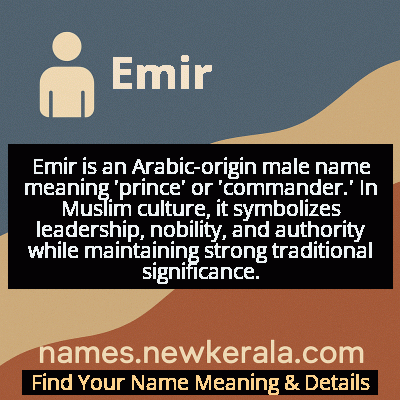Emir Name Meaning & Details
Origin, Popularity, Numerology Analysis & Name Meaning of Emir
Discover the origin, meaning, and cultural significance of the name EMIR. Delve into its historical roots and explore the lasting impact it has had on communities and traditions.
Name
Emir
Gender
Male
Origin
Muslim
Lucky Number
9
Meaning of the Name - Emir
Emir is an Arabic-origin male name meaning 'prince' or 'commander.' In Muslim culture, it symbolizes leadership, nobility, and authority while maintaining strong traditional significance.
Emir - Complete Numerology Analysis
Your Numerology Number
Based on Pythagorean Numerology System
Ruling Planet
Mars
Positive Nature
Generous, passionate, energetic, and humanitarian.
Negative Traits
Impulsive, impatient, moody, and can be overly emotional.
Lucky Colours
Red, maroon, scarlet.
Lucky Days
Tuesday.
Lucky Stones
Red coral, garnet.
Harmony Numbers
1, 2, 3, 6.
Best Suited Professions
Military, sports, philanthropy, leadership roles.
What People Like About You
Courage, energy, leadership, generosity.
Famous People Named Emir
Emir Kusturica
Film Director
Two-time Palme d'Or winner at Cannes Film Festival
Emir Spahić
Footballer
Former captain of the Bosnia and Herzegovina national team
Emir Preldžić
Basketball Player
EuroBasket 2017 silver medalist with Slovenia
Emir Bajrami
Footballer
Swedish international and Allsvenskan champion
Name Variations & International Equivalents
Click on blue names to explore their detailed meanings. Gray names with will be available soon.
Cultural & Historical Significance
In contemporary Muslim societies, Emir remains a popular choice that connects modern families to their rich historical heritage. The name symbolizes aspirations for leadership, success, and moral authority while maintaining religious and cultural authenticity. It's particularly cherished in Bosnia, where it represents both Islamic identity and European integration, and in Turkey, where it bridges traditional Ottoman heritage with modern republican values. The name's enduring popularity across diverse Muslim communities demonstrates its ability to transcend specific national boundaries while maintaining core cultural meanings of nobility and responsibility.
Extended Personality Analysis
People named Emir typically exhibit strong leadership qualities combined with a natural charisma that draws others to them. They often demonstrate exceptional organizational abilities and strategic thinking, making them effective in positions of responsibility. Their confidence is usually tempered by a sense of duty and moral compass, leading them to make decisions that consider the wellbeing of their community or group. From childhood, many Emirs show early signs of maturity and responsibility, often taking charge in group activities and demonstrating protective instincts toward peers.
In interpersonal relationships, Emirs are generally loyal, reliable, and protective of their loved ones. They tend to be excellent communicators who can articulate their vision clearly while also listening to others' perspectives. While they can be decisive and assertive when circumstances demand, they typically prefer consensus-building and diplomatic approaches to conflict resolution. Their combination of strength and empathy often makes them natural mentors and role models. Many develop a strong sense of identity and purpose early in life, driven by the symbolic weight their name carries and the expectations it creates for leadership and integrity.
Modern Usage & Popularity
In contemporary naming practices, Emir has evolved from its historical aristocratic connotations to become a widely popular given name across Muslim communities worldwide. The name maintains strong popularity in Bosnia and Herzegovina, where it frequently appears in top baby name lists, reflecting both cultural pride and modern appeal. Similarly, in Turkey and Arabic-speaking countries, Emir remains a fashionable choice that balances traditional significance with contemporary style. The name has also gained traction in Western countries with significant Muslim populations, particularly in Western Europe and North America, where its elegant pronunciation and clear meaning make it accessible across cultural boundaries. Recent decades have seen Emir's popularity rise internationally as global connectivity increases appreciation for multicultural names with deep historical roots and positive connotations.
Symbolic & Spiritual Meanings
Symbolically, Emir represents the ideal of righteous leadership and protective authority. Beyond its literal meaning of 'prince,' the name embodies concepts of guidance, responsibility, and moral stewardship. It suggests someone who not only commands respect but earns it through wisdom, fairness, and concern for those under their care. Metaphorically, Emir symbolizes the bridge between individual ambition and community welfare—the idea that true leadership serves others rather than dominating them. The name carries connotations of legacy and continuity, representing the transmission of values across generations while adapting to contemporary challenges. In many cultural contexts, naming a child Emir expresses hopes that they will become a positive influence in their community, combining strength of character with compassionate leadership.

